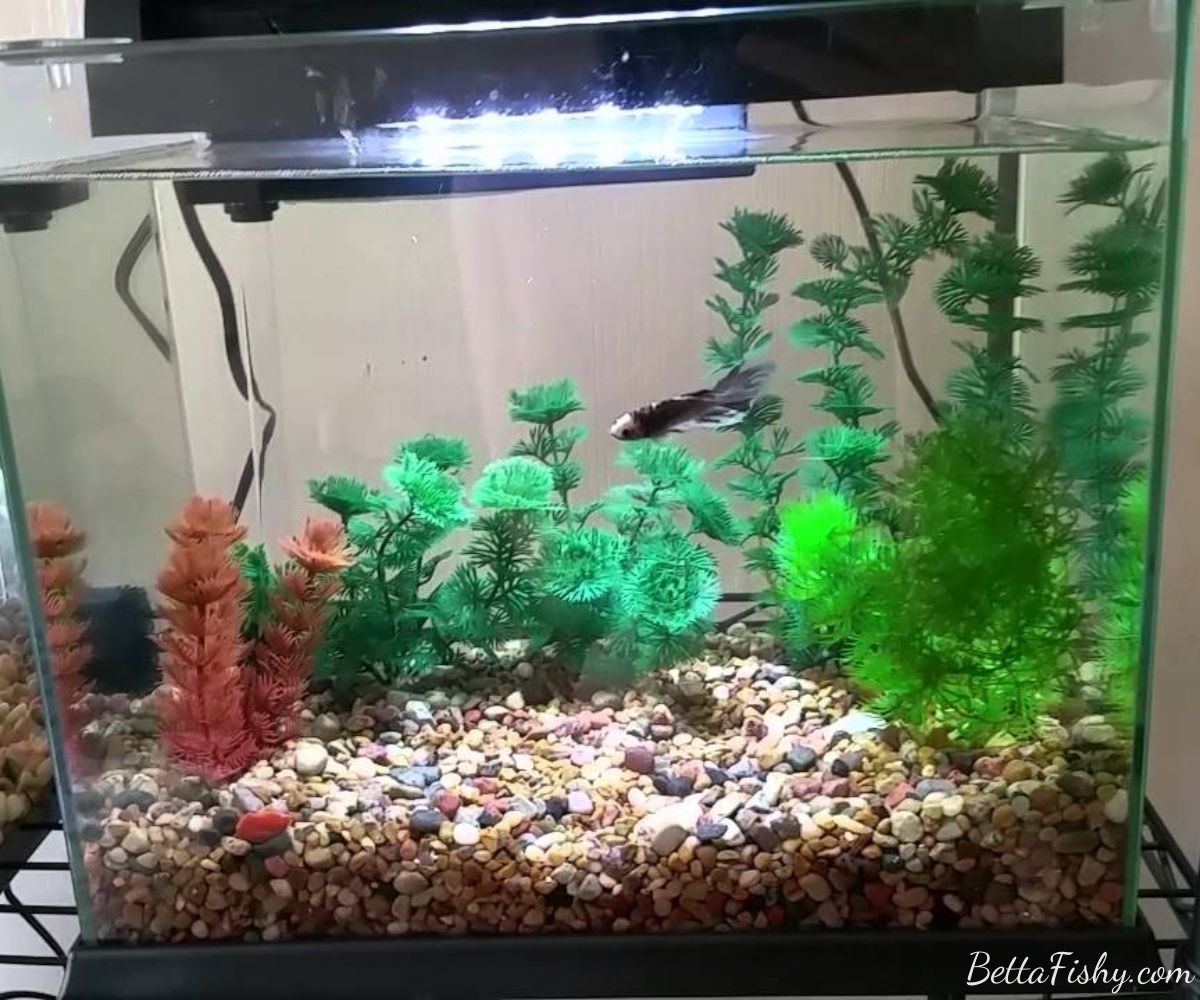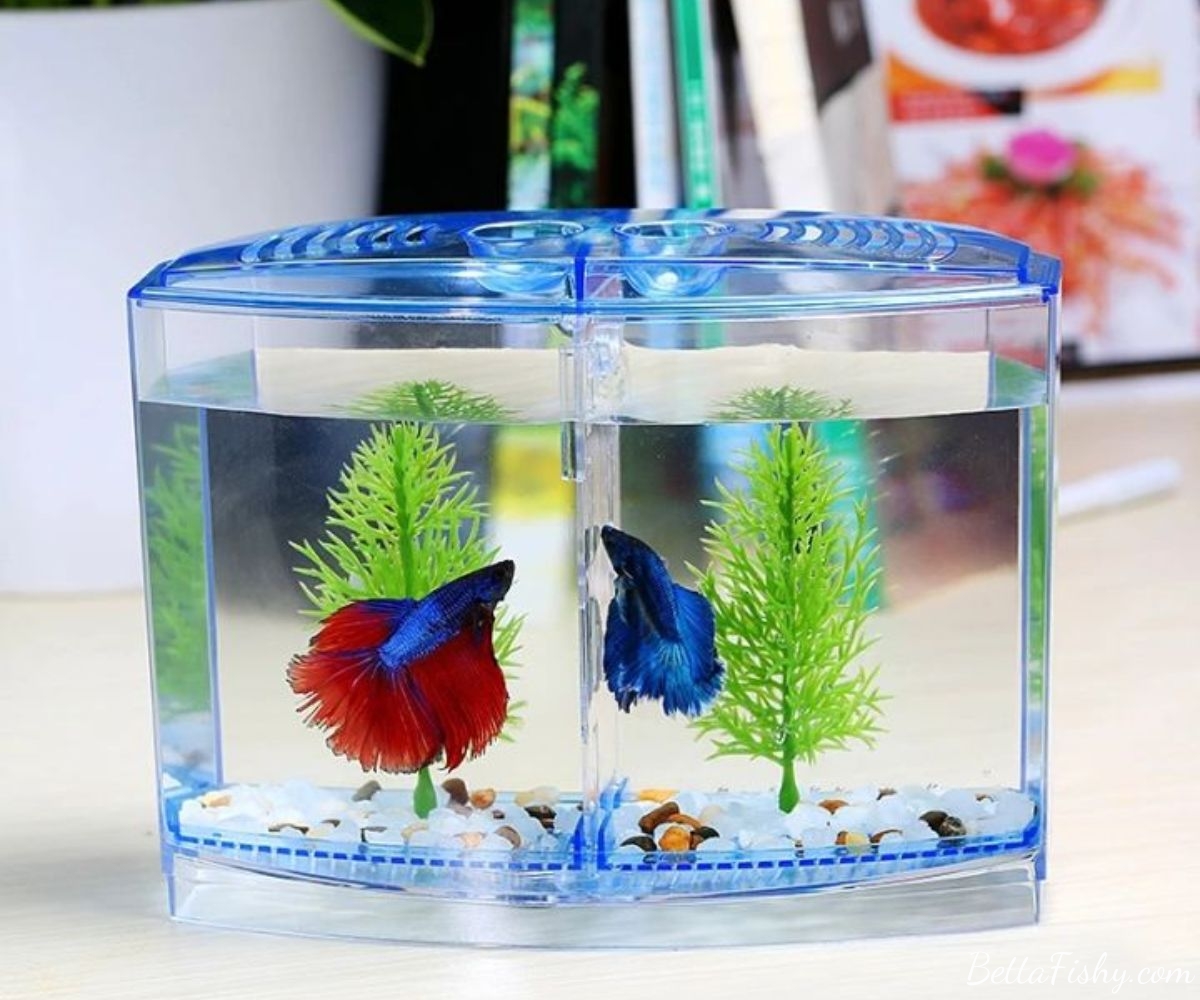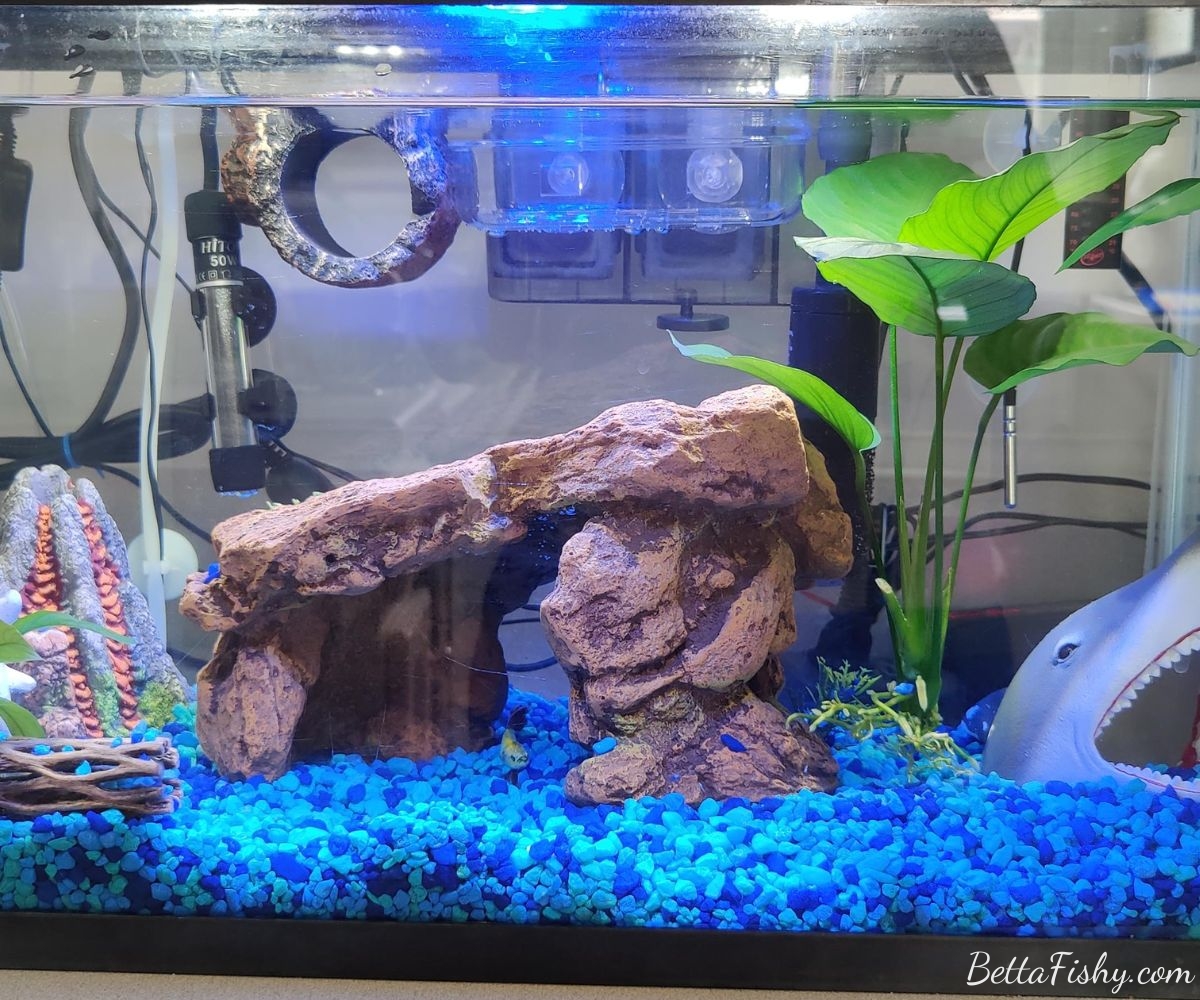Betta fish, also known as Siamese fighting fish, are vibrant and captivating freshwater fish that have gained immense popularity among aquarium enthusiasts. Their alluring colors, elegant fins, and captivating behavior make them a beloved choice for many. However, despite their resilience and hardiness, betta fish can face various health challenges that may lead to their untimely demise. As a betta fish owner, it can be heartbreaking to ask yourself, “Why did my betta fish die?” In this article, BettaFishy will discuss eight reasons why your betta fish may have met its end and how you can prevent it from happening in the future.
8 Reasons to Answer the Question Why did My Betta Fish Die?
Reason 1: Poor Water Quality and Lack of Proper Filtration

One of the most common reasons for betta fish death is poor water quality and lack of proper filtration. Betta fish thrive in clean and well-maintained water environments, and any deviation from this can significantly compromise their health and well-being. Here are some essential aspects to consider:
Regular Water Changes
Maintaining a consistent water change schedule is crucial for maintaining good water quality. Aim to perform partial water changes weekly, replacing approximately 20-30% of the water with fresh, properly conditioned water. This helps dilute harmful pollutants and waste products, preventing the accumulation of toxins. It is also essential to vacuum the substrate during water changes to remove any uneaten food or debris that may have settled at the bottom of the tank.
Choose a Reliable Filter
A reliable and appropriately sized filter is essential for maintaining the cleanliness and clarity of the water. A filter helps to remove physical and chemical impurities from the water, ensuring a healthy and safe environment for your betta fish. When choosing a filter, consider the size of your tank and the number of fish you have. A general rule of thumb is to have a filter that can handle at least three times the volume of your tank. For example, if you have a 10-gallon tank, your filter should be able to process at least 30 gallons of water per hour.
Water Quality Testing
Regularly testing the water quality in your betta fish tank is crucial for identifying any potential issues. You can purchase a water testing kit from your local pet store or use test strips to check for levels of ammonia, nitrites, nitrates, and pH. These parameters should be within a specific range for your betta fish to thrive. Any significant deviations from these ranges can indicate poor water quality and the need for immediate action.
| Water Parameter | Ideal Range |
|---|---|
| Ammonia | 0 ppm |
| Nitrites | 0 ppm |
| Nitrates | < 20 ppm |
| pH | 6.5 – 7.5 |
Reason 2: Overfeeding and Obesity
Betta fish are known to have hearty appetites, and it can be tempting to feed them more than they need. However, overfeeding can lead to obesity, which can have severe consequences for your betta fish’s health. Excess food that is not consumed will sink to the bottom of the tank and decompose, leading to an increase in ammonia levels and poor water quality. Here are some tips to prevent overfeeding and obesity in your betta fish:
Schedule Fish Feeding Appropriately
Establishing a feeding schedule for your betta fish can help prevent overfeeding. Adult betta fish should be fed once or twice a day, with no more than three pellets or flakes per feeding. It is best to observe your betta fish while feeding to ensure they are consuming all the food and not leaving any behind.
Variety in Diet
A varied diet is essential for the overall health of your betta fish. While betta fish primarily eat pellets or flakes, they also enjoy live or frozen foods such as bloodworms, brine shrimp, and daphnia. These foods are rich in nutrients and can provide a more balanced diet for your betta fish.
Avoid Overfeeding
It is crucial to avoid overfeeding your betta fish, even if they seem hungry. Overfeeding can lead to obesity, which can cause various health issues such as swim bladder disorder, fatty liver disease, and shortened lifespan. If you notice your betta fish becoming overweight, reduce the amount of food you feed them and increase their exercise by providing them with toys or plants to swim around.
Reason 3: Incompatible Tank Mates and Aggressive Behavior of Bettas
Betta fish are known for their aggressive behavior, especially towards other male bettas. It is essential to carefully consider tank mates when setting up a community tank for your betta fish. Here are some factors to keep in mind:
Tank Size
The size of your tank plays a significant role in determining the compatibility of tank mates for your betta fish. A larger tank provides more space for fish to establish territories and reduces the likelihood of aggression. A general rule of thumb is to have at least a 10-gallon tank for a community tank with betta fish.
Choose Peaceful Tank Mates
When choosing tank mates for your betta fish, opt for peaceful and non-aggressive species. Avoid fish with long, flowing fins, as they can be mistaken for another betta fish and trigger aggressive behavior. Some suitable tank mates for betta fish include small schooling fish like neon tetras, harlequin rasboras, and corydoras catfish.
Observation and Separation
Even with careful planning, there is always a risk of aggression between tank mates. It is essential to observe your fish closely and separate any aggressive individuals to prevent injuries or death. If you notice your betta fish becoming aggressive towards their tank mates, consider removing them and providing them with a separate tank.
Reason 4: Inadequate or Improperly Sized Tank

Betta fish are often sold in small cups or containers, leading to the misconception that they can thrive in small spaces. However, betta fish require adequate space to swim and establish territories, and a small tank can lead to stress and health issues. Here are some factors to consider when choosing a tank for your betta fish:
Tank Size
As mentioned earlier, a general rule of thumb is to have at least a 10-gallon tank for a betta fish. This provides enough space for them to swim and establish territories without feeling cramped. A larger tank also means more stable water parameters, reducing the risk of stress and illness.
Tank Shape
The shape of your tank can also play a role in your betta fish’s well-being. Avoid tall, narrow tanks as they do not provide enough horizontal swimming space for betta fish. Instead, opt for longer and wider tanks that allow for more natural swimming patterns.
Tank Decorations
Adding plants, rocks, and other decorations to your betta fish tank can provide hiding places and break up lines of sight, reducing aggression between tank mates. It is essential to choose decorations that are safe for your betta fish and do not have sharp edges that can cause injuries.
Reason 5: Temperature Fluctuations and Incorrect Water Heater Usage
Betta fish are tropical fish and require a consistent water temperature between 76-82°F (24-28°C). Any significant fluctuations in temperature can cause stress and weaken their immune system, making them more susceptible to diseases. Here are some tips to ensure your betta fish’s tank is at the optimal temperature:
Use a Water Heater
A reliable water heater is essential for maintaining a consistent water temperature for your betta fish. Choose a heater that is appropriate for the size of your tank and has an adjustable thermostat to set the desired temperature. It is also essential to place the heater near the filter outlet to distribute the heated water evenly throughout the tank.
Monitor Temperature in the Aquarium
It is crucial to monitor the temperature in your betta fish tank regularly. You can use a thermometer to check the temperature or invest in a heater with a built-in thermometer. If you notice any significant fluctuations, adjust the heater accordingly to maintain the desired temperature.
Avoid Drastic Temperature Changes
Avoid exposing your betta fish to drastic temperature changes, such as placing their tank near a window or air conditioner. These sudden changes can cause shock and stress, leading to health issues. It is also essential to acclimate your betta fish to the tank’s temperature before adding them to their new home.
Reason 6: Stressful Environment and Lack of Hiding Places

Betta fish are sensitive creatures and can easily become stressed in an unsuitable environment. Stress can weaken their immune system, making them more susceptible to diseases and other health issues. Here are some factors that can contribute to a stressful environment for betta fish:
The Number in the Tank is Overcrowding
Overcrowding can lead to competition for resources and territory, causing stress and aggression among tank mates. As mentioned earlier, it is crucial to consider the tank size and the number of fish when setting up a community tank for your betta fish.
Bright Lights and Loud Noises
Betta fish prefer dimly lit environments and can become stressed if exposed to bright lights for extended periods. It is also essential to keep their tank away from loud noises, as they have excellent hearing and can be easily startled.
Lack of Hiding Places
Betta fish are known to hide when feeling stressed or threatened. A lack of hiding places in their tank can make them feel vulnerable and increase their stress levels. Adding plants, rocks, and other decorations can provide hiding places for your betta fish and make them feel more secure.
Reason 7: Diseases and Health Issues
Despite their hardiness, betta fish are not immune to diseases and health issues. Various factors can contribute to the development of illnesses in betta fish, such as poor water quality, stress, and inadequate nutrition. Here are some common diseases and health issues that can lead to betta fish death:
Fin Rot
Fin rot is a bacterial infection that affects the fins and tail of betta fish. It is often caused by poor water quality and can lead to the deterioration of the fins and tail, making it difficult for betta fish to swim and causing them to become lethargic.
Ich
Ich, also known as white spot disease, is a parasitic infection that causes small white spots on the betta fish’s body and fins. It is highly contagious and can spread quickly in an aquarium. If left untreated, ich can be fatal for betta fish.
Swim Bladder Disorder
Swim bladder disorder is a condition that affects a betta fish’s ability to maintain buoyancy and swim properly. It can be caused by overfeeding, constipation, or bacterial infections. Betta fish with swim bladder disorder may have difficulty swimming, floating to the surface or sinking to the bottom of the tank.
Fatty Liver Disease
Fatty liver disease is a condition that occurs when betta fish consume too much fatty food, leading to the accumulation of fat in their liver. This can cause their liver to enlarge and interfere with its function, leading to various health issues and potentially death.
Reason 8: Natural Causes
Lastly, it is essential to remember that betta fish, like any living creature, have a limited lifespan. On average, betta fish live for two to three years, but this can vary depending on genetics, diet, and environment. It is essential to provide the best possible care for your betta fish, but it is also important to accept that their time with us is limited.
Conclusion
In conclusion, the heartbreaking question “Why did my betta fish die?” can have various answers, ranging from poor water quality to natural causes. As a responsible betta fish owner, it’s crucial to become a detective seeking clues in the environment. Regular water changes, adequate filtration, and monitoring water temperature are essential for maintaining a healthy habitat, eliminating the leading suspect: poor water quality. Choosing compatible tank mates, providing enough space, and creating a stress-free environment can also contribute to your betta fish’s well-being, reducing the chances of stress-related illnesses.
Lastly, don’t hesitate to seek professional help if you notice any signs of illness – early intervention can sometimes turn “Why did my betta fish die?” into a story of successful recovery. With proper care and attention, you can ensure your betta fish lives a long and healthy life, leaving you with joyful memories instead of unanswered questions.”.


